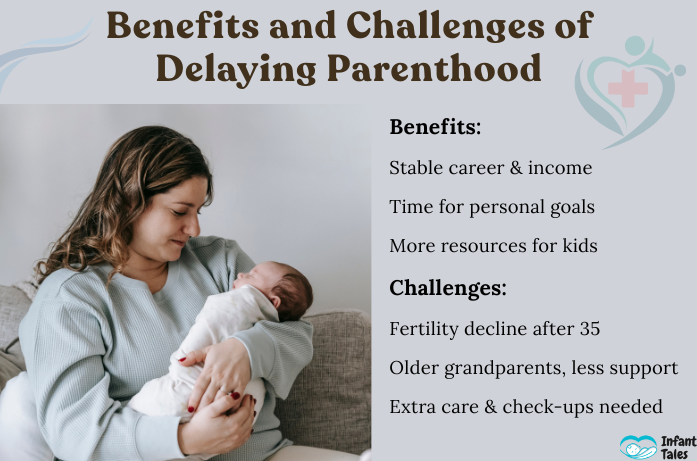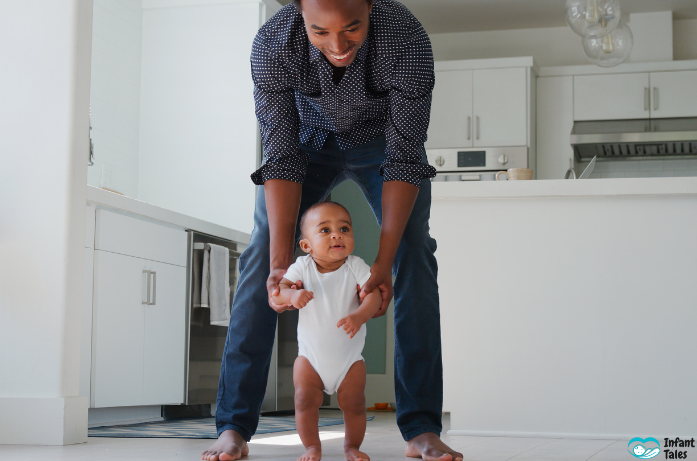By Infant Tales Team
In earlier days, youngsters would be married and start a family. Now, the canvas seems to have been painted with a completely different set of shades. Now, many parents wait till their thirties-and sometimes forties-to welcome their first child. This ever-growing shift can be witnessed worldwide-in small towns as well as big cities.
So why is it that parents wait longer to have children? And what does such a choice mean for the family, the child, and society? Let’s look into the common reasons for Parents Delay Having Children, the advantages and disadvantages of such a situation, and what it finally implies today.
1. Educational Goals Come First
For young adults, education comes ahead of planning for children. College, postgraduate studies, or any professional training programs demand years of commitment. During these years, the emphasis is on gaining knowledge, building skills and creating future opportunities. Before thinking about children.
According to the Pew Research Center, more women than ever are completing higher education, which naturally pushes family planning to a later stage. University life and advanced studies demand time, focus, and financial resources, challenges that can feel overwhelming when combined with parenthood in the early twenties.
2. Building Career and Financial Stability
Raising children is joyful but comes with heavy financial responsibilities. From prenatal care and delivery to childcare, food, health, and education, expenses begin even before birth and continue for many years. Without steady income or savings, these large expenses can overwhelm parents.
The USDA states that it costs more than $233,000 to raise a child till he or she is 18 (excluding college). No wonder many couples work on their careers, save money, buy a home, or get health insurance before thinking about giving life to a child. Financial stability assures parents to provide the best life for their kids.
3. Changing Social and Cultural Norms
Cultural norms have shifted. Some generations ago, anything but early marriage and parenthood were frowned upon. Now, there is respect and even encouragement for various life paths.
Marriage has also begun to happen later: in fact, the average age of first marriage has risen steadily around the world. It naturally follows that children also come later. In many of these urban, professional communities, it is no longer unusual but expected to start a family around 30 years of age or later.
4. Better Family Planning Options
Parents today have the luxury of time considering modern contraception and reproductive healthcare. In the past, parents were traditionally pressured into childbearing either by age or social expectation. But now, they can decide to give birth when they feel emotionally ready, financially secure, and are confident of their relationship. This freedom brings less pressure and greater confidence at the start of family life..
Organizations like the Centers for Disease Control and Prevention (CDC) provide valuable information and also serve as good reference points for information regarding fertility, contraception, and pregnancy. These resources empower parents to make informed choices regarding parenthood at a time that is right for them, rather than simply because others expect it of them.
5. Wanting Personal Freedom and Growth
Parenting changes lives, and it is what many young adults wish to explore in the fullest before-taking-on. Traveling, hobbies, relationship-building, or just enjoying independence can all feel like priorities before making an eternal commitment to children.
This isn’t selfish; it means that the person realizes that parenthood demands certain sacrifices and that fulfilling one’s needs first could lead to more confident and better-prepared parents later on.
6. Advances in Fertility Technology
One lesson science teaches couples is the importance of timing. Earlier, fertility challenges meant limited options. These days, reproductive techniques (IVF, egg freezing, genetic screening) have offered opportunities to many to postpone childbearing with assurance.
The American Society for Reproductive Medicine believes that options for fertility preservation are becoming popular among people who want to develop their careers in their twenties but keep the possibility of having children in the background for later.
Still, it must be kept in mind that biology exists, fertility naturally declines with age, and success rates with assisted reproduction vary.
7. Emotional Readiness Matters Too
Sometimes it’s just that couples don’t feel ready to have a child inside them. To nurture a child, patience, stability, and emotional strength are a must.
Parents who wait longer will help parents develop stronger relationships, better mental well-being, and a supportive home to raise kids, resulting in a healthier start for children!
8. Rising Cost of Living and Childcare
Many global reports show that the cost of housing, healthcare and childcare is rising faster than wage growth in many places. This economic pressure makes it even more difficult for parents to raise children in countries where parents receive little government support.
For example, studies from the Organisation for Economic Co-operation and Development (OECD) reveal that in many countries, childcare costs translate into a huge portion of household income, leading many families to postpone childbearing until they feel more financially secure.

9. Benefits and Challenges of Delaying Parenthood
Waiting Benefits include:
- Career and income stability: More time to finish school and develop one’s career means more savings, less transient jobs, and lowered financial anxiety.
- Personal goals and fulfillment: Prospective parents may want to explore life, travel, or engage in hobbies before making their commitment, so they feel more emotionally ready later.
- More resources for children: Older parents might be able to afford better child care, education, and experiences.
Challenges of late pregnancy may include
- Fertility decline after 35: Conception may become more difficult, whereas pregnancy risks, such as high blood pressure or gestational diabetes, increase.
- Older grandparents: Family support may be reduced as grandparents grow less active with age.
- Additional Care: Late pregnancies tend to need more monitoring and additional check-ups.
Doctors usually recommend talking to a medical practitioner soon about fertility timelines, especially if planning on having children in the late thirties or later.
11. Is There a “Right Time”?
The truth is, there is no right time to have children. Some parents feel ready in their twenties, whereas some others think they function best having waited till later. Every path is different.
The most important thing is to be able to consider and triumph in the decision, factoring in personal goals, emotional readiness, and financial security, and health. What is most important is what a parent through love, care, and support offers to the child regardless of when parenting begins.
FAQs
1. Why do parents delay having children?
Mostly for the reason of education, careers, and financial security, or for emotional readiness.
2. Does waiting affect fertility?
Yes, fertility declines with age, especially after 35, though medical options can help.
3. What are the advantages of waiting?
More stability, better relationships, stronger resources for children.
4. What are the disadvantages?
Harder to conceive, pregnancy risks, and grandparents too old.
5. Is there a right age to have kids?
No, every family is different. The right time is when you feel ready.
Final Thoughts
Keeping in line with evolving modern truths, late parenthood remains an option. Education, careers, money matters, and personal aspirations all shape when a person feels truly ready to become a parent.
At Infant Tales, we feel that parenthood is different for every individual circumstance. Whenever you decide to start a family at 22 to 42 age the thing that counts most is giving your child a good, loving environment.
Disclaimer: This article is meant for the purposes of information and education and is therefore not to be construed as medical advice. For individual advice on fertility, family planning, or pregnancy, please seek out an appropriate health care professional.



